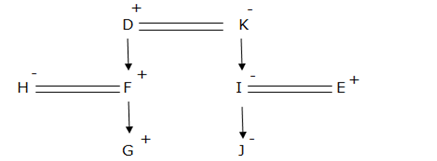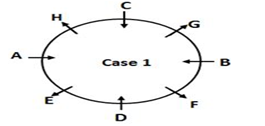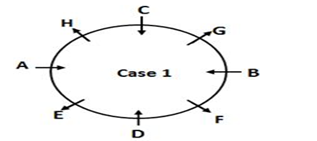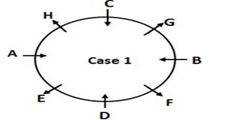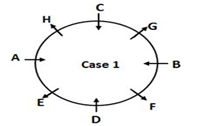Question 1: 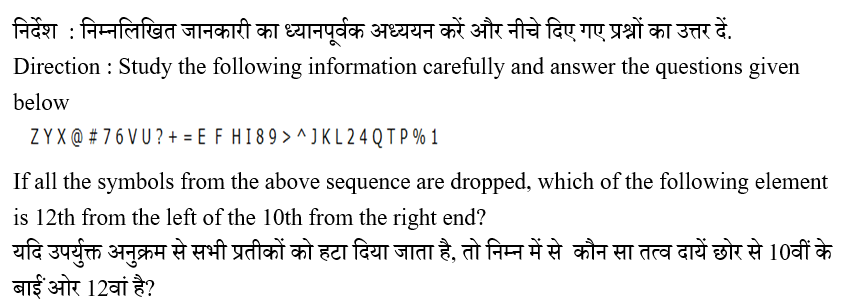
Question 2: 
Question 3: 
Question 4: 
Question 5:
निर्देश : निम्नलिखित जानकारी का ध्यानपूर्वक अध्ययन करें और नीचे दिए गए प्रश्नों का उत्तर दें:
Direction : Study the following information carefully and answer the questions given below:
परिवार में आठ सदस्य D, E, F, G, H, I, J, और K हैं जिनमे तीन विवाहित जोड़ें और तीन पीढ़ियां है। D, H का ससुर हैं और उनके दो बच्चे हैं। F, J का मामा हैं। E, F का बहनोई/साला है। E के केवल एक बेटी हैं। G, I का भतीजा/भांजा है। I, H की भाभी/ननद है, जिसका कोई भाई-बहन नहीं है। K क्रमशः G और E की दादी और सास है।
There are eight members viz. D, E, F, G, H, I, J, and K in a family with three married couples and three generations. D is father-in-law of H and has two children. F is the maternal uncle of J. E is the brother-in-law of F. E has only one daughter. G is the nephew of I. I is the sister-in-law of H, who doesn’t have any sibling. K is the paternal grandmother and mother-in-law of G and E respectively.
How is E related to D?
E, D से कैसे संबंधित है?
Question 6:
निर्देश : निम्नलिखित जानकारी का ध्यानपूर्वक अध्ययन करें और नीचे दिए गए प्रश्नों का उत्तर दें:
Direction : Study the following information carefully and answer the questions given below:
परिवार में आठ सदस्य D, E, F, G, H, I, J, और K हैं जिनमे तीन विवाहित जोड़ें और तीन पीढ़ियां है। D, H का ससुर हैं और उनके दो बच्चे हैं। F, J का मामा हैं। E, F का बहनोई/साला है। E के केवल एक बेटी हैं। G, I का भतीजा/भांजा है। I, H की भाभी/ननद है, जिसका कोई भाई-बहन नहीं है। K क्रमशः G और E की दादी और सास है।
There are eight members viz. D, E, F, G, H, I, J, and K in a family with three married couples and three generations. D is father-in-law of H and has two children. F is the maternal uncle of J. E is the brother-in-law of F. E has only one daughter. G is the nephew of I. I is the sister-in-law of H, who doesn’t have any sibling. K is the paternal grandmother and mother-in-law of G and E respectively.
How is G related to K?
G, K से कैसे संबंधित है?
Question 7:
निर्देश : निम्नलिखित जानकारी का ध्यानपूर्वक अध्ययन करें और नीचे दिए गए प्रश्नों का उत्तर दें।
Direction : Study the following information carefully and answer the questions given below.
आठ व्यक्ति A, B, C, D, E, F, G और H एक वृत्ताकार टेबल के गिर्द बैठे हैं लेकिन जरूरी नहीं उसी क्रम में। उनमें से चार केंद्र की ओर मुख किए हैं और शेष केंद्र के विपरीत ओर मुख किए हैं।
Eight persons A, B, C, D, E, F, G and H are sitting around a circular table but not necessarily in the same order. Four of them are facing towards the center and remaining is facing opposite to the center.
B, D के दाईं ओर दूसरे स्थान पर बैठता है। F, C के बाईं ओर तीसरे स्थान पर बैठता है। E, G के विपरीत बैठता है जो C और B का निकटतम पड़ोसी है। A, F और H के विपरीत नहीं बैठता है। F, केंद्र के बाहर की ओर मुख करता है और A के दाईं ओर तीसरे स्थान पर बैठता है। A और F विपरीत दिशा की ओर मुख करते हैं। A का निकटतम पड़ोसी उसी दिशा की ओर मुख करते हैं जिस दिशा में A के विपरित व्यक्ति करता है। B और C एक ही दिशा की ओर मुख करते हैं।
B sits second to the right of D. F sits third to the left of C. E sits opposite to G who is an immediate neighbor of C and B. A doesn’t sits opposite to F and H. F faces outside the center and sits third to the right of A. A and F are facing opposite direction. Immediate neighbor of A are facing same direction which is opposite to A. B and C are facing same direction.
Who sits immediate right of B?
B के तुरंत दाईं ओर कौन बैठता है?
Question 8:
निर्देश : निम्नलिखित जानकारी का ध्यानपूर्वक अध्ययन करें और नीचे दिए गए प्रश्नों का उत्तर दें।
Direction : Study the following information carefully and answer the questions given below.
आठ व्यक्ति A, B, C, D, E, F, G और H एक वृत्ताकार टेबल के गिर्द बैठे हैं लेकिन जरूरी नहीं उसी क्रम में। उनमें से चार केंद्र की ओर मुख किए हैं और शेष केंद्र के विपरीत ओर मुख किए हैं।
Eight persons A, B, C, D, E, F, G and H are sitting around a circular table but not necessarily in the same order. Four of them are facing towards the center and remaining is facing opposite to the center.
B, D के दाईं ओर दूसरे स्थान पर बैठता है। F, C के बाईं ओर तीसरे स्थान पर बैठता है। E, G के विपरीत बैठता है जो C और B का निकटतम पड़ोसी है। A, F और H के विपरीत नहीं बैठता है। F, केंद्र के बाहर की ओर मुख करता है और A के दाईं ओर तीसरे स्थान पर बैठता है। A और F विपरीत दिशा की ओर मुख करते हैं। A का निकटतम पड़ोसी उसी दिशा की ओर मुख करते हैं जिस दिशा में A के विपरित व्यक्ति करता है। B और C एक ही दिशा की ओर मुख करते हैं।
B sits second to the right of D. F sits third to the left of C. E sits opposite to G who is an immediate neighbor of C and B. A doesn’t sits opposite to F and H. F faces outside the center and sits third to the right of A. A and F are facing opposite direction. Immediate neighbor of A are facing same direction which is opposite to A. B and C are facing same direction.
Which of the following person is an immediate neighbor of A?
निम्नलिखित में से कौन सा व्यक्ति A का निकटतम पड़ोसी है?
Question 9:
निर्देश : निम्नलिखित जानकारी का ध्यानपूर्वक अध्ययन करें और नीचे दिए गए प्रश्नों का उत्तर दें।
Direction : Study the following information carefully and answer the questions given below.
आठ व्यक्ति A, B, C, D, E, F, G और H एक वृत्ताकार टेबल के गिर्द बैठे हैं लेकिन जरूरी नहीं उसी क्रम में। उनमें से चार केंद्र की ओर मुख किए हैं और शेष केंद्र के विपरीत ओर मुख किए हैं।
Eight persons A, B, C, D, E, F, G and H are sitting around a circular table but not necessarily in the same order. Four of them are facing towards the center and remaining is facing opposite to the center.
B, D के दाईं ओर दूसरे स्थान पर बैठता है। F, C के बाईं ओर तीसरे स्थान पर बैठता है। E, G के विपरीत बैठता है जो C और B का निकटतम पड़ोसी है। A, F और H के विपरीत नहीं बैठता है। F, केंद्र के बाहर की ओर मुख करता है और A के दाईं ओर तीसरे स्थान पर बैठता है। A और F विपरीत दिशा की ओर मुख करते हैं। A का निकटतम पड़ोसी उसी दिशा की ओर मुख करते हैं जिस दिशा में A के विपरित व्यक्ति करता है। B और C एक ही दिशा की ओर मुख करते हैं।
B sits second to the right of D. F sits third to the left of C. E sits opposite to G who is an immediate neighbor of C and B. A doesn’t sits opposite to F and H. F faces outside the center and sits third to the right of A. A and F are facing opposite direction. Immediate neighbor of A are facing same direction which is opposite to A. B and C are facing same direction.
Who sits third to the right of the person who sits opposite to F?
F के विपरीत बैठे व्यक्ति के दाईं ओर तीसरे स्थान पर कौन बैठता है?
Question 10:
निर्देश : निम्नलिखित जानकारी का ध्यानपूर्वक अध्ययन करें और नीचे दिए गए प्रश्नों का उत्तर दें।
Direction : Study the following information carefully and answer the questions given below.
आठ व्यक्ति A, B, C, D, E, F, G और H एक वृत्ताकार टेबल के गिर्द बैठे हैं लेकिन जरूरी नहीं उसी क्रम में। उनमें से चार केंद्र की ओर मुख किए हैं और शेष केंद्र के विपरीत ओर मुख किए हैं।
Eight persons A, B, C, D, E, F, G and H are sitting around a circular table but not necessarily in the same order. Four of them are facing towards the center and remaining is facing opposite to the center.
B, D के दाईं ओर दूसरे स्थान पर बैठता है। F, C के बाईं ओर तीसरे स्थान पर बैठता है। E, G के विपरीत बैठता है जो C और B का निकटतम पड़ोसी है। A, F और H के विपरीत नहीं बैठता है। F, केंद्र के बाहर की ओर मुख करता है और A के दाईं ओर तीसरे स्थान पर बैठता है। A और F विपरीत दिशा की ओर मुख करते हैं। A का निकटतम पड़ोसी उसी दिशा की ओर मुख करते हैं जिस दिशा में A के विपरित व्यक्ति करता है। B और C एक ही दिशा की ओर मुख करते हैं।
B sits second to the right of D. F sits third to the left of C. E sits opposite to G who is an immediate neighbor of C and B. A doesn’t sits opposite to F and H. F faces outside the center and sits third to the right of A. A and F are facing opposite direction. Immediate neighbor of A are facing same direction which is opposite to A. B and C are facing same direction.
Which of the following makes first person sits third to the right of the second person?
निम्न में से कौन, पहले व्यक्ति को दूसरे व्यक्ति के दाईं ओर तीसरे स्थान पर बैठने की स्थिति को दर्शाता है?


